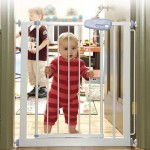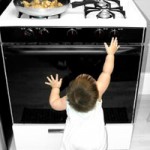Basic Home Safety Checklist and Guidelines for Children
What should be Done ?
- Always maintain the baby neat & clean.
- Cut the nails properly with maximum possible care.
- Wet diaper should be removed immediately and parts should be cleaned with soft baby soap.
- Take care of the genitals because the fungal infection is common in this part and should be kept dry.
- Care of the scalp is very important. Fungic Infections and dermatitis can be prevented by the cleaning.
- Tight dress can cause irritation. The dress should be loose and should allow the air inside.
- Sufficient light and ventilation should be there in the room. It should be free of dust and the insects.
- Child’s bed should be separate, water proof bed is better and it should arranged close to the mother’s bed.
- It is good to have some music making toys near the baby.
- While carrying, give support to the baby’s head with hand. Since the muscles of neck are weak and the sudden fall of the head can be dangerous.
- Mother’s milk is the best nutrition for the baby. It also gives the emotional attachment. The mother’s milk should be given according to the need for babies and in sitting position. The proper cleaning of the nipple is also necessary. The mother should take good nutritional and healthy food in the period of breast feeding.
- If there is any problem in breast feeding, the cow’s milk can be given. The feeding-bottle should be sterilized with warm water and kept with dryness until the next use.
- Cow’s milk should be boiled and cooled before feeding it to baby. Certain diseases like bovine tuberculosis, brucellosis are spread by unboiled milk.
- Some children are allergic to certain substances like food, milk, beauty products and dress etc. Try to find the cause of allergy material and avoid such things.
- Mosquito repellents should be used regularly to prevent diseases like malaria, dengue, filariose, yellow fever. Mosquito can also produce eruptions of skin with some allergic reactions. It also disturbs during sleep.
- Calm atmosphere should be maintained for a good sleep of baby. Compared to the adults, infants
 need more sleep. Growth hormones are activated during the sleep.
need more sleep. Growth hormones are activated during the sleep. - Growth, behavioral, personal social development and development of language occurs according to the age. However the parents do not need to be impatient because these vary from individual to individual.
- Measurement of growth according to weight and height should be checked regularly.
- In first month the infant can defecate after each feed. The suitable toilet training should be given as the infant develops. The infant can be placed on the seat of toilet by the ten months age.
- Toilet seat should be cleaned with the liquid disinfectant before and after the use. It should not be shared by other children.
- If the baby shows some signs of the distress like excessive crying, convulsions, high fever with the rigour, rigidity of neck, the frequent vomiting and diarrhoea, bluish discoloration of the body, difficult breathing with the growl, consult your doctor immediately.
- The first aid box should be kept in the home. It should contain sterile cotton, equipping materials, lotion, ointment disinfectant and the forceps. Phone numbers of the doctors, ambulance, police should be kept on a separate book for easy access in emergency.
- Child’s medicines of should be kept in the separate box. Information about dose mode of administration should be written in a paper to avoid any confusion.
- While driving with the child, the baby should be in the separate seat with safety belt.
- When you leave home with the baby, keep an identity card written your phone number and address inside infant’s pocket.
- When the infant begins walking, always accompany him to prevent falling and injury.
- If an emergency occurs, take first aid measures and carry the victim to the nearest hospital.
What should not be done ?
- Never shake the baby, it can damage the brain.
- Don’t keep small articles in the approach of the baby.
- The sharp pointed articles like the pen, pencil, knife etc. should not be given to the children.
- Avoid the entry of water inside to the ear while giving a bath.
- Food should not be given of forcibly when the baby is crying or coughing.
- Do not overfeed the baby.
- Articles like mosquito repellents, moth balls, ink, gum, medicines, etc should be maintained party.
- Avoid tight clothing.
- Baby should not be placed close to the edge of the bed.
- Avoid giving the baby to strangers to avoid close contact with others.
- All the electric instruments should be kept away from baby’s reach and baby’s bed should be distant enough from electric wires and switches.
- Kitchen is a dangerous place for children. Don’t leave them alone in the kitchen.
- Water level in the bath tub should be minimum and never leave child in the tub alone for a moment. Don’t even go to attend the phone call or to see if door bell rings when the baby is in the tub.
- Never smoke near the baby.
- Pets should not come very close to the children. Nails of pets should be cut properly and anti rabies injection must be given.
- When the child starts to walk, he should not be left alone upstairs and not allowed to climb stairs
 himself.
himself. - Strong light should be avoided in the infant’s room.
- When you travel, don’t give the food or articles given by co-passengers.
- Don’t let the baby crawl on the dirty ground.
- Sick people should be away from the infant to avoid spreading infection.
- Don’t carry the baby in hospital unnecessarily. The crowded markets and the polluted dusty sectors should be avoided.
- Table lamp should not be kept close to the children, it may cause problems.
- Adults medicine should not be given to the children.
- Expired medicines should never be used.
More safety tips:
Chocking: The baby can swallow any object and cause the obstruction. Immediately make the baby lie down on the abdomen and press the abdomen from the back towards the chest. You can also stroke the upper back to pull the object out itself. If you get no success, call the expert person or doctor.
Accidental Poisoning: Try to take out the substance with induce the vomiting. Wash the body with water to reduce absorption by the skin. Identify the poison and carry the victim to the hospital immediately.
Burns: Immediately remove the source of heat and put clean cool water. Burned cloths should not be removed immediately. Cover the wound with sterile cotton and take him at the close hospital.
Wounds: Clean the wound with clean water and stop the bleeding by compression and raising the wound above the level of heart or use a tourniquet to compress blood-vessels. Then cover the wound with cotton and bandage consult a doctor.
Drowning in Bathtub: Take the baby out immediately and keep the head down position. Press the abdomen gently or give a mouth to mouth sucking until the air is released. Give the infant mouth to mouth breathing and cardiac massage, then carry the victim to the hospital.
Electric Shock: Stop the power source. Observe the victim, if there is no breathing give the mouth to mouth breath with the cardiac massage and take to the hospital immediately.